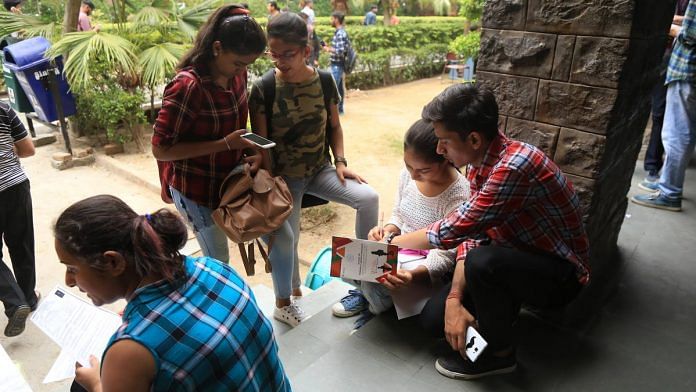
New Delhi: The University Grants Commission (UGC) has asked universities to offer up to 40 per cent of the courses in any programme online on SWAYAM, the central government’s Massive Open Online Courses (MOOCs) platform.
Academics have questioned this move, citing issues such as the need for classroom instruction, lack of infrastructure on campus, and large numbers of students falling on the wrong side of the digital divide.
Making courses available online through SWAYAM was prescribed last year under the University Grants Commission (Credit Framework for Online Learning Courses through Study Webs of Active Learning for Young Aspiring Minds) Regulations, 2021. The UGC has now asked universities to follow this rule.
A circular sent to the vice chancellors of all universities and principals of all colleges Wednesday asked them to comply in large numbers, and submit an action-taken report.
The circular issued by UGC secretary Rajnish Jain said, “Several universities have already accepted SWAYAM courses for credit transfer, and [the] remaining universities are also requested to take similar measures and intimate the action taken.”
“It is earnestly hoped that universities and colleges will come forward in large numbers to adopt the SWAYAM courses for credit transfer, and encourage more and more students to enroll in these courses,” it added.
The circular went on to say, “As you are aware, [the] SWAYAM platform is set up with the objective to ensure that every student in our country has access to the best quality of higher education at an affordable cost.”
The secretary also shared a list of MOOCs courses with the universities and colleges and asked them to get approval from their academic councils. “These courses may be approved and adopted on the recommendation of dean academics/ heads of department for credit transfer and ratified by the academic council,” the council added.
Also Read: No cut-offs in DU, different type of merit list at BHU — how CUET’s changing college admission
‘Imperative to have classroom contact with students’
Academics have questioned the wisdom and practicality of this initiative.
Speaking to ThePrint, Delhi University professor A.K. Bhagi said, “A lot of students who come to universities in India — take Delhi University also for example — are first-time learners. It is imperative to have classroom contact with such students. One cannot rely on online modules. It was different when colleges were closed, but now that everything is open, teaching-learning should happen in classrooms.”
He added that such a policy is neither desirable nor feasible.
Rajesh Jha, another professor at Delhi University, said “Online classes as a replacement for on-campus classes are not effective or feasible due to a lack of infrastructure and equipment with the majority of students.”
“The challenge of remote education gets more aggravated as we have a large number of students coming from the Scheduled Castes, Scheduled Tribes, Other Backward Classes, Economically Weaker Sections, and Persons with Disabilities, and from far-flung areas like the Northeast and Jammu and Kashmir, who are mostly on the wrong side of the digital divide,” he further said.
He added that if this is implemented across universities and colleges, it will drastically reduce the workload of teachers and thus displace ad-hoc teachers, as there will be no more demand for them.
Deepak Singh, a teacher at Magadh University in Bihar, said that in universities that don’t have the infrastructure, it ‘s impossible even to understand such a policy.
“We do not have enough infrastructure to even hold offline classes in a proper manner. How are we going to communicate this kind of change in the policy to teachers and students…it is not doable,” he said.
(Edited by Rohan Manoj)
Also Read: ‘Will college degrees carry same weight abroad as university’s?’ UGC reform norms find few takers

COMMENTS